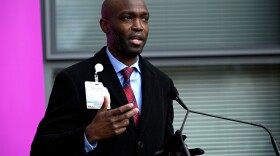Two Connecticut residents from Venezuela are calling for continued sanctions and stepped-up pressure from the international community to end the crisis in their native country.
Kiara Matos told Connecticut Public Radio that she left Venezuela after her husband was nearly kidnapped.
“It seems someone had been following him for two months and they tried to kidnap him, but they kidnapped his partner instead,” she said. “When you get these calls, you will never end up knowing if it’s true, but back then they told us, ‘Don’t call the police because we’re the police. Don’t call the government because we’re the government. Just pay the ransom if you want to see your friend alive.’”
So they paid the ransom. Then she, her husband and kids left and moved to Connecticut. Matos is a ceramics artist and her husband now runs two bakeries – one in New Haven, another in Branford.
Venezuelan native Domingo Medina has a composting business in New Haven. He said Matos’ story is not uncommon.
“If you go to Venezuela right now and ask anybody, anybody – randomly – there is a story of somebody that was mugged, somebody that was kidnapped, somebody that was stabbed, somebody that was threatened. Everybody has a story of insecurity. Everybody,” he said.
Both Matos and Medina said people in Venezuela are living in survival mode.
When she calls her family, Matos said she hears that, “All my mother and my sister do all day, instead of work and raise kids, is drive around -- when they have gas, after they have spent an entire day lining up for a tank of gas -- and asking if there is cheese. And if there is cheese, ‘Can you take my card?’ Because there is no cash to pay you with.”
Medina’s mother has joined the protests.
“She is walking the streets. She is receiving tear gas. She’s protesting. That’s where she feels she belongs,” Medina said. “She was a young communist in Venezuela where she fought to end the dictatorship in 1958, and now she never thought that she was going to be, in her almost 80 years of age, fighting another dictatorship.”
Both said most Venezuelans want to see a peaceful transition to a new government.
Matos believes the international community needs to “push toward this transition process where we have a body that we can rely on to bring us to a fair and clean election.”
“Listen I also want to say, we don’t want any military intervention,” said Medina. “No one wants a military intervention. Once you start an intervention, you know, when its starts, you don’t know where it's going to finish.”
Still, Matos added, “I think my Venezuelan people would not forgive me if I said…..if this means military intervention, then let's do it. I’m sure. People in Venezuela who would be hearing me would say, ’Why didn’t you ask for it?’ It's scary, But that’s the clamor. We’re willing to go through that. But please put an end to this dictatorship.”
Both Matos and Medina believe that international response to Venezuela now will serve as a point of reference for response to crisis situations in other countries in years to come.




